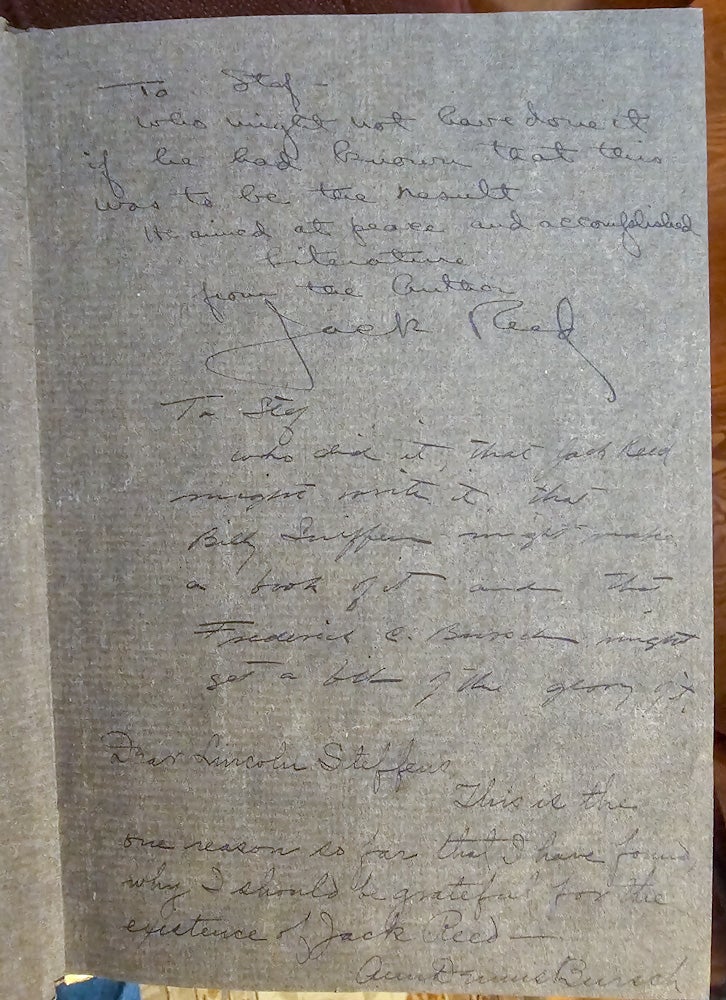
SANGAR. TO LINCOLN STEFFENS (The DEDICATION Copy Inscribed to Lincoln Steffens)
Riverside, CT: Hillacre, 1913. First Edition. Hardcover. Small quarto (6-1/2" x 9-3/4"); dark brown paper boards stamped in gilt on front and spine; publisher's cardboard slipcase. Illustrated with a frontispiece photograph of Lincoln Steffens with tissue guard. One of only 500 copies of Reed's first book, a poem subtitled "The mad recreant knight of the west." This is the dedication copy, INSCRIBED and SIGNED by Reed as well as by each of the publishers, Frederick C. and Anne D. Bursch, in ink on the dark grey front endpaper. Reed writes: "To Stef --/who might not have done it/if he had known that this/was to be the result./He aimed at peace and accomplished literature./From the author/Jack Reed." John Reed was perhaps the best known left-wing American journalist of the twentieth century; he was portrayed by Warren Beatty in the film REDS, nominated for twelve Academy Awards and winner of three, which centered on Reed's life, his romance with Louise Bryant, and his early death at 33 in Moscow. Lincoln Steffens gained fame as one of the earliest muckrakers, exposing corruption in business and government. The publishers have each INSCRIBED the book on the same leaf: "To Stef/who did it that Jack Reed/might write it, that/Billy S[ ] might make/a book of it and that/Frederick C. Bursch might/get a bit of the glory of it." And: "Dear Lincoln Steffens,/This is the/one reason so far that I have found/why I should be grateful for the/existence of Jack Reed./Ann Denise Bursch." Fine in a close to Very Good original and fragile slipcase with some loss. In a specially made Fine cloth clamshell box. Item #015417
Steffens's complex and, ultimately, doomed effort to mediate in the infamous 1911 McNamara trial in Los Angeles inspired Reed's composition of this "Christian allegory." The McNamara brothers, John and James, leaders of the radical international association of bridge and structural iron workers union, were indicted for the 1910 dynamiting of the LOS ANGELES TIMES building which killed twenty people. Initially supporters of the McNamaras protested that the charges against the brothers were trumped up and that the deadly explosion was attributable to faulty maintenance by management. But as the trial dragged on even the brothers' own lawyer, Clarence Darrow, grew convinced of their guilt. It was at this point that Steffens interceded (at whose request remains unclear to this day), confident that some permutation of the "golden rule" could be applied to resolve the case to the satisfaction of both sides and that the residual benefit of such a "Christianly" settlement would be a dialogue between capital and labor. But Steffens's meddling apparently infuriated Judge Bordwell, who tossed the book at the McNamaras even after they'd altered their pleas to guilty expecting to be shown leniency. Both brothers received lengthy prison terms. Steffens was blasted from all sides. Capital -- led by Harrison Gray Otis, proprietor of the TIMES, and Theodore Roosevelt -- thumbed their noses at him, as did labor, cheerleaded by Emma Goldman and Max Eastman, who charged Steffens with sanctimonious naiveté for collaborating with the anti-McNamara forces. Reed's position was more ambiguous and he composed SANGAR ostensibly in praise of his mentor's work in Los Angeles. Reed went so far as to read SANGAR aloud to Steffens in a Greenwich Village restaurant prior to sending it off to POETRY magazine, where Harriet Monroe not only published it but gave it an award. But twenty years later when he wrote his autobiography, and Reed was many years dead, Steffens took no pride in the dedication. "John Reed, my own boy," he noted, "wrote a fierce poem, 'Sangar,' denouncing me."
Price: $6,000.00


